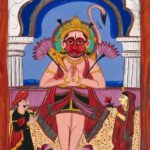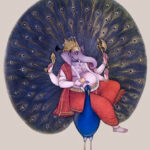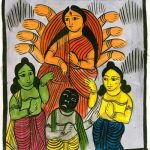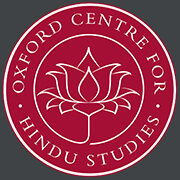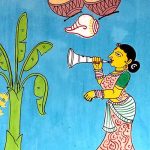Hindu Devotional Music and Chant
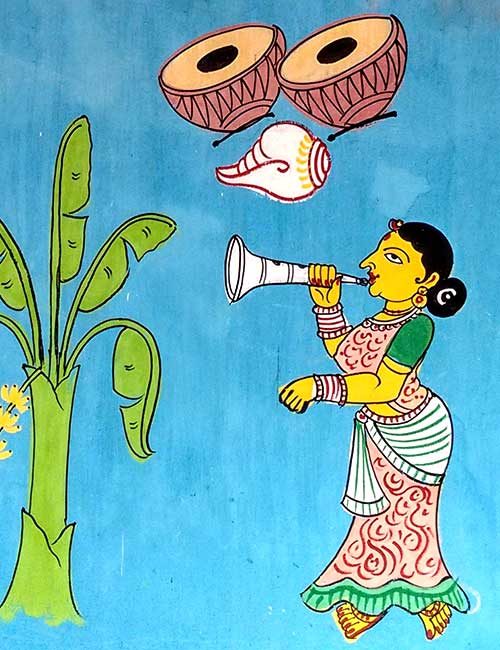
Devotional music and chanting practices have been a crucial part of ancient Indian cultures and are still a vital part of Hindu culture today. Chant and music are interwoven throughout Hinduism, and are an indispensable feature of modern Hindu life.
This Hindu Devotional Music and Chant course will introduce you to the theoretical and practical aspects of Hindu music and chant within the culture and its impact on the Hindu religion. This course encourages the study and analysis of main sources of music and chant, including theories related to the practices of sacred sound. Each session contains practical details involved in understanding the proper execution of Hindu chant and music, as well as listening examples via audio files. Musical training is not required to participate in this course.
Students are encouraged to participate in sampling and comparing different audio examples and study the origins, theological concepts, and ritual associations related to Hindu devotional music and chant. This course is a unique and engaging experience, providing a specialist insight into the importance of traditional music and chant within Hindu culture and religion and how it has evolved over time.
For the course breakdown and to sign up, please read the information below. If you’re looking for a different course, please view our range of topics here.
Start Date: 18 January 2026
Course Duration: Seven Weeks
111 pages
On-Demand Video
The main video component of your course. On-demand means you can watch at the time that suits you.
8hr 38min
Community Discussions
These free Zoom sessions are not part of your main course materials. They are led by OCHS-affiliated scholars and open to students enrolled in any course.
Explore other areas of Hindu studies! Meet tutors and students from other courses!
Monday, 26 January, 12noon
Tuesday, 3 February, 2pm
Thursday, 12 February, 3pm
Saturday, 21 February, 5pm
Sunday, 1 March, 6pm
These are all UK times. Recordings are available for any sessions you miss
While there is a section on musical instruments in Session Three, the main focus of this course is on vocal music, which is the central focus of performance practice in terms of Hindu worship and devotion. Each session contains practical details involved in the manner of understanding the proper execution of Hindu chant and music, as well as listening examples in the form of audio files. Musical training is not required.
Session One: Om and Veda – The Foundation of Hindu Sacred Sound, Chant, and Music
We look at the main sources of music and chant, including theories and practices of sacred sound as understood from the Vedas and Upanishads, beginning with the syllable Om, the Rig Veda, and ending with the Sāma Veda.
Session Two: Mantra – Sacred Sound as Chant
This session will focus on the theory and practice of Mantra in the Hindu tradition, beginning with a general outline of Mantra in ancient India, including linguistic debates and Tantra, followed by examples of key Mantras from selected lineages. Two recorded selections of Mantra chant conclude the session.
Session Three: Sangīta – Sacred Sound as Music
This session begins the topic of music or Sangīta, with information on the mythical origins, theological concepts, ritual associations, structural forms and genres, along with explanations of how music actually directs the human mind to the divine in contemplation and worship.
Session Four: Introduction to Bhakti Music –Kīrtan and Bhajan
This session will cover Kīrtan and Bhajan, the two most important and most widely prevalent categories of Hindu devotional music in India and in the diaspora. Appearing in ancient scriptures as simply ‘praise or worship of a deity’, the terms Kīrtan and Bhajan were later associated with musical performance, and for the past thousand years or more have been primarily linked with a musical event comprising songs of glorification and worship of God or the chanting of the names of a deity. They are nearly synonymous with ‘Bhakti Sangit’, devotional music that became central to the growth of the medieval Bhakti traditions.
Session Five: Bhakti Music – Haveli Sangit
The final three sessions will focus on three specific forms of Bhakti Sangit, classical devotional music, that have flourished within the traditions of Vaishnavism: Haveli Sangit, Samāj Gāyan, and Padāvali Kīrtan.
This session examines Haveli Sangit, the temple music tradition of the Vallabha lineage.
Session Six: Bhakti Music – Samāj Gāyan
This session continues the focus on Vaishnava music by examining another important tradition, Samāj Gāyan. Three of the ‘Krishna Sampradāyas’ established in medieval Braj have adopted Samāj Gāyan as their primary devotional music. Samāj Gāyan is the most vocally interactive style of Pada-Kīrtan, and as a form of responsorial singing requires training and diligence to perform properly. Despite the fact that it is often obscured from the general public, Samāj Gāyan is regularly performed and cultivated within the Rādhāvallabha Sampradāya founded by Shri Hita Harivamsa (1502-1552), the Nimbārka Sampradāya founded by Shri Nimbārka (ca. 1200), and the Haridasi Sampradāya founded by Swami Haridas (ca. 1475-1580), all centered in Vrindaban. Although Samāj Gāyan conforms to the definitional parameters of Pada-Kīrtan, the specific terms Kīrtan or Bhajan are not employed in these three traditions.
Session Seven: Bhakti Music and Classical Music – Padāvali Kīrtan and Khayal
This final session consists of two parts. Part 1 will examine the topic of Padāvali Kīrtan, the most important form of Bhakti Sangit in eastern India. Part two describes the tradition of Khayal, the most popular form of Hindustani vocal classical music currently performed in India and abroad. In addition to an example of Padāvali Kīrtan, there are four examples of Khayal that convey Hindu teachings of philosophy and devotion.
Associated Courses
Your Tutor

Prof. Guy Beck
Guy L. Beck is a scholar, author, musician, educator, historian of religions, and musicologist. A Fulbright-Nehru Senior Research Fellow and Visiting Fellow at the Oxford Centre for Hindu Studies (Oxford University, UK), he is Lecturer in Philosophy, Religious Studies and Asian Studies at Tulane University, and Adjunct Professor of Religious Studies at Loyola University New Orleans. Guy Beck is the first to publish a comprehensive study of the nature and function of sacred sound (Nada-Brahman) in the Hindu religion. He has created the first college textbook on music in the major world religions and is the first American to perform vocal music in an all-India conference of Hindustani classical music. Prof. Beck has produced the first and most complete collection of field recordings, translations, and annotations of the hymns and religious songs of the Radhavallabha Sampradaya, a Vaishnava or Krishna sect based in Vrindavan in northern India. His most recent publication is Musicology of Religion: Theories, Methods, and Directions (SUNY Press, 2023).
